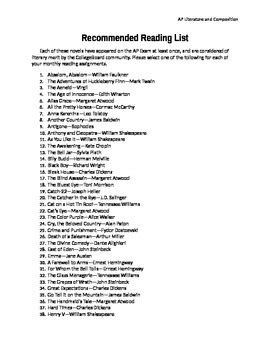A Journey through Literary Masterpieces
Prepare yourself for a transformative literary voyage as we delve into the official AP Lit reading list, a cornerstone of the Advanced Placement English Literature and Composition course. This meticulously curated selection of literary masterpieces will guide you through a profound exploration of human nature, the power of language, and the enduring legacy of the written word.

The Power of Choice: Tailoring Your Reading Experience
The AP Lit reading list offers a diverse range of genres, themes, and perspectives, empowering you to tailor your reading experience to your unique interests and literary aspirations. Choose from compelling novels, thought-provoking plays, poignant poetry collections, and profound nonfiction works that will challenge your beliefs, spark your imagination, and broaden your horizons.
A Literary Smorgasbord: Exploring Diverse Perspectives
Fiction
-
The Great Gatsby by F. Scott Fitzgerald (1925): Immerse yourself in the glittering world of 1920s New York through the lens of the enigmatic Jay Gatsby.
-
To Kill a Mockingbird by Harper Lee (1960): Witness the complexities of race, justice, and innocence in the American South as seen through the eyes of a young girl.
-
Beloved by Toni Morrison (1987): Confront the horrors of slavery and the resilience of the human spirit in this Pulitzer Prize-winning novel.
Drama
-
Hamlet by William Shakespeare (1603): Delve into the depths of human nature, betrayal, and revenge in Shakespeare’s timeless tragedy.
-
Death of a Salesman by Arthur Miller (1949): Explore the American dream and the challenges of a changing society through the eyes of a disillusioned salesman.
-
A Raisin in the Sun by Lorraine Hansberry (1959): Witness the struggles of an African American family striving for a better life in the face of prejudice and discrimination.
Poetry
-
The Canterbury Tales by Geoffrey Chaucer (14th century): Journey through medieval England alongside a colorful cast of pilgrims and encounter timeless themes of love, loss, and faith.
-
Leaves of Grass by Walt Whitman (1855): Experience the transcendentalist spirit and the beauty of the American landscape in Whitman’s free-verse masterpiece.
-
The Waste Land by T.S. Eliot (1922): Traverse the fragmented and disillusioned world of the post-World War I era through Eliot’s complex modernist poem.
Nonfiction
-
The Autobiography of Benjamin Franklin (1791): Learn from the life and wisdom of one of America’s founding fathers, offering valuable insights into the Enlightenment period.
-
Narrative of the Life of Frederick Douglass, an American Slave (1845): Witness the horrors of slavery firsthand through the powerful and moving account of a former slave whose words continue to inspire and challenge.
-
The Worldly Philosophers by Robert Heilbroner (1953): Explore the economic theories and philosophies that have shaped human history.
Reading Strategies for Literary Excellence
To maximize your understanding and appreciation of this rich literary repertoire, employ effective reading strategies:
-
Annotate actively: Highlight important passages, make marginal notes, and write down your thoughts and observations.
-
Analyze critically: Examine the text for deeper meanings, identify literary devices, and evaluate the author’s purpose and technique.
-
Synthesize creatively: Connect the texts to broader literary themes, historical contexts, and your own personal experiences.
Tips for Enhancing Your Reading Experience
-
Set realistic reading goals: Break down the reading material into manageable chunks to avoid feeling overwhelmed.
-
Create a dedicated reading space: Establish a quiet and comfortable environment where you can focus on your literary journey.
-
Join a discussion group: Engage with fellow students or literary enthusiasts to share insights and foster a deeper understanding of the works.
Compare and Contrast: Analyzing Literary Techniques
Compare and contrast the literary techniques employed by different authors:
Use of Symbolism
- How does Fitzgerald use the green light at the end of Daisy’s dock in The Great Gatsby?
- What significance does the mockingbird symbolize in To Kill a Mockingbird?
- How does Morrison utilize the image of the “Beloved” throughout her novel?
Character Development
- Analyze the psychological depth and complexity of Hamlet in Shakespeare’s play.
- Trace the transformation of Willy Loman in Death of a Salesman.
- Examine the resilience and determination of Sethe in Beloved.
Theme Exploration
- Discuss the themes of love, loss, and redemption in The Great Gatsby.
- Explore the themes of race, prejudice, and justice in To Kill a Mockingbird.
- Analyze the themes of memory, trauma, and the search for identity in Beloved.
Conclusion: A Literary Legacy
The official AP Lit reading list is a literary treasure trove that provides a profound exploration of the human condition and the power of storytelling. By immersing yourself in these masterpieces, you will cultivate a deep appreciation for language, develop critical thinking skills, and gain invaluable insights into the intricacies of the human experience. Remember, the journey is as important as the destination, so savor each word and allow yourself to be transformed by the timeless wisdom and beauty of these literary giants.
